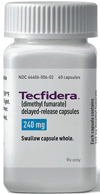 The multiple sclerosis market is a work in progress, with several candidate drugs poised to shake things up and a reimbursement landscape that's growing increasingly tricky. And according to one analyst, that means trouble for Biogen ($BIIB).
The multiple sclerosis market is a work in progress, with several candidate drugs poised to shake things up and a reimbursement landscape that's growing increasingly tricky. And according to one analyst, that means trouble for Biogen ($BIIB).
The Massachusetts biotech--whose MS drugs generated 80% of its revenue in 2015--has the "resources and research" to remain at the forefront of the category, Leerink Partners analyst Geoffrey Porges wrote in a Sunday note to clients. But reimbursement challenges are "dampening the outlook for this class," he said, and with new products coming along, he predicts the company is "likely to lose share over time and face flat-to-declining sales."
One of those new products is Roche's ($RHHBY) ocrelizumab, which Porges expects to grab a "significant" piece of the pie. The therapy, expected to win FDA approval and launch in early 2017, so far appears to offer efficacy that's close to best-in-class; "reasonable" safety and tolerability (in an arena where many drugs have liabilities in that department, no less); and convenient dosing, with infusions needed only once every 24 weeks, he pointed out.
And while Biogen will net a royalty from ocrelizumab's U.S. sales ranging from 13.5% to 24%--as well as a 3% royalty on sales outside the U.S.--Porges expects the med's success to come at the expense of Biogen's own Tysabri, which carries a risk of the rare but deadly brain disease PML. Plus, as Bernstein analyst Ronny Gal has predicted, the Roche med's arrival could ramp up the formulary pressure on older MS meds, meaning Biogen could feel a squeeze on multiple fronts.
Of course, Biogen has a stake in another newcomer, too--to be dubbed Zinbryta--but Porges doesn't expect that one to go too far. Biogen and Illinois pharma AbbVie ($ABBV) will share sales of the med, but serious safety and tolerability concerns help make it more likely to become a niche product for those patients at high risk for PML and those who have failed on multiple other meds, he figures.
Meanwhile, the Cambridge drugmaker has been doing all it can to keep its star MS pill Tecfidera on a high-growth trajectory. In February, Biogen announced that the drug had racked up $993 million in Q4 sales, a 16% year-over-year increase. And while that's not the red-hot growth rate the product displayed in its younger days, it's still a good sign for the company, which has begun backing the drug with a big marketing dollars.
Special Reports: Top 15 drug launch superstars - Tecfidera | The top 10 best-selling multiple sclerosis drugs of 2013 - Tecfidera - Avonex - Tysabri | The top 20 highest-paid biopharma CEOs - George Scangos